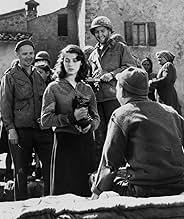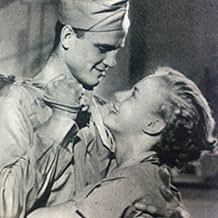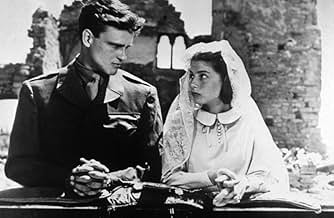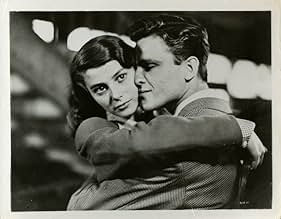Aggiungi una trama nella tua linguaA reluctant soldier, Peter, serves in Italy during WWII. He marries a local girl named Teresa and brings her to the US.A reluctant soldier, Peter, serves in Italy during WWII. He marries a local girl named Teresa and brings her to the US.A reluctant soldier, Peter, serves in Italy during WWII. He marries a local girl named Teresa and brings her to the US.
- Regia
- Sceneggiatura
- Star
- Candidato a 1 Oscar
- 1 vittoria e 2 candidature totali
Lewis E. Ciannelli
- Cheyenne
- (as Lewis Cianelli)
Guido Martufi
- Sergio Russo
- (non citato nei titoli originali)
Recensioni in evidenza
My main reasons for seeing 'Teresa' were for Fred Zinnemann and the subject. Zinnemann made a number of great films, 'High Noon', 'The Day of the Jackal', 'A Man for All Seasons' and 'From Here to Eternity' and was a fine director. The subject was a bold one at the time and the studio could never be commended enough for tackling difficult contemporary issues for the time (some still relevant now) and mostly handling them uncompromisingly. The mixed reviews weren't enough to deter me.
On the most part, to me 'Teresa' was a very sincere and brave effort. A well done film with a lot of merits, the best of them quite brilliantly executed. It is not great and has a few big drawbacks, and as far as Zinnemann's films go it towards the lesser end. That 'Teresa' did so courageously in tackling a subject as tough as this and generally not doing too bad a job with it is to be applauded in my view, even if it doesn't completely succeed (which was a bit of a shame).
'Teresa's' biggest issue is John Ericson, who did not have an easy role admittedly but was clearly over-parted by it. He didn't have the charisma, intensity or pathos for the role and often seemed unsure of how to play the character or what to do with him. The whole character came over as muddled, with such all over the place motivations and such it was very difficult to feel anything for him.
Do agree too with those that have said that the ending was very abrupt and too mawkish, which did feel at odds with the tone of the rest of the film. The script is not always very focused and could have gone into more depth in places.
Generally though, that it pulled no punches, was intelligently written and was written with honesty and respect was much appreciated. The story, regardless of any slightness, mostly does very well executing such a bold subject, and does so so sincerely and so movingly. It had hard-hitting tension and also poignant pathos, nothing is sugar-coated here. Zinnemann's direction is understated which did suit the film and to me it didn't go overboard on that and he didn't seem disinterested or uncomfortable with the material.
Visually, 'Teresa' is very well made with an effective documentary-like approach to the filming. The locations are nice too. The score is moody without being intrusive. The supporting cast are very good, with two of the most interesting characters being those for Ralph Meeker and Patricia Collinge. Rod Steiger is also very good in a very early role and one of his more subdued ones. Best of all is a truly touching Pier Angeli, whose performance and presence is always genuine with nothing ringing false.
All in all, a lot to recommend but with a better male lead and ending 'Teresa' could have been a winner. 7/10
On the most part, to me 'Teresa' was a very sincere and brave effort. A well done film with a lot of merits, the best of them quite brilliantly executed. It is not great and has a few big drawbacks, and as far as Zinnemann's films go it towards the lesser end. That 'Teresa' did so courageously in tackling a subject as tough as this and generally not doing too bad a job with it is to be applauded in my view, even if it doesn't completely succeed (which was a bit of a shame).
'Teresa's' biggest issue is John Ericson, who did not have an easy role admittedly but was clearly over-parted by it. He didn't have the charisma, intensity or pathos for the role and often seemed unsure of how to play the character or what to do with him. The whole character came over as muddled, with such all over the place motivations and such it was very difficult to feel anything for him.
Do agree too with those that have said that the ending was very abrupt and too mawkish, which did feel at odds with the tone of the rest of the film. The script is not always very focused and could have gone into more depth in places.
Generally though, that it pulled no punches, was intelligently written and was written with honesty and respect was much appreciated. The story, regardless of any slightness, mostly does very well executing such a bold subject, and does so so sincerely and so movingly. It had hard-hitting tension and also poignant pathos, nothing is sugar-coated here. Zinnemann's direction is understated which did suit the film and to me it didn't go overboard on that and he didn't seem disinterested or uncomfortable with the material.
Visually, 'Teresa' is very well made with an effective documentary-like approach to the filming. The locations are nice too. The score is moody without being intrusive. The supporting cast are very good, with two of the most interesting characters being those for Ralph Meeker and Patricia Collinge. Rod Steiger is also very good in a very early role and one of his more subdued ones. Best of all is a truly touching Pier Angeli, whose performance and presence is always genuine with nothing ringing false.
All in all, a lot to recommend but with a better male lead and ending 'Teresa' could have been a winner. 7/10
Teresa was one of several marvelous 1951 films that fell off the radar screen.
Others were 'Night and the City', Jules Dassin's best film and possibly the best "film noir" ever made; 'Bullfighter and the Lady' (forget the "B" picture title, it was far better than the more famous 'The Brave Bulls'; and 'The Sound of Fury', titled also later the same year 'Try and Get Me'.
Teresa joins this list of scarcely seen gems. It was John Ericson's first film, but also his best. It does (as your reviewer says) resemble, in its depiction of parental smothering, 'Rebel Without a Cause'. However, Teresa was better. It does Fred Zinnemann proud. It was more sensitive than his touching film of two years earlier, 'The Search'.
What a year 1951 was for forgotten films that were better than many well-known, fondly remembered ones.
Others were 'Night and the City', Jules Dassin's best film and possibly the best "film noir" ever made; 'Bullfighter and the Lady' (forget the "B" picture title, it was far better than the more famous 'The Brave Bulls'; and 'The Sound of Fury', titled also later the same year 'Try and Get Me'.
Teresa joins this list of scarcely seen gems. It was John Ericson's first film, but also his best. It does (as your reviewer says) resemble, in its depiction of parental smothering, 'Rebel Without a Cause'. However, Teresa was better. It does Fred Zinnemann proud. It was more sensitive than his touching film of two years earlier, 'The Search'.
What a year 1951 was for forgotten films that were better than many well-known, fondly remembered ones.
Fred Zinnemann's attempt at Neo-Realism is a drab story about a soldier who brings his war bride back to America to live with his disappointment of a father and his overbearing mother. Pier Angeli, as the bride, is lovely, but John Ericson, as the soldier, isn't up to the acting challenge asked of him. Patricia Collinge is decent as his mom, but everyone is done a disservice by Zinnemann's detached direction. I think he was going for understated realism but everything is so understated as to be lacking in any kind of emotional impact whatsoever.
"Teresa" received a 1951 Oscar nomination for Best Motion Picture Story, a category that later was absorbed into the Original Screenplay Oscar.
Grade: C
"Teresa" received a 1951 Oscar nomination for Best Motion Picture Story, a category that later was absorbed into the Original Screenplay Oscar.
Grade: C
This is one depressing movie. So many of the lead characters are unpleasant, it really is difficult to know where to start. Let me begin with the most unpleasant character of all. John Ericson. He began as a Mama's Boy, joined the Army and became a misfit and coward, married and was a lousy husband, and finally walked out on his responsibilities as a father. Throughout the movie he whines, cries, and bitches about his lot in life. One has to wonder, even with the demands of war, how he ever got into the service. In his first encounter with the enemy - he is reduced to a quivering blob crying for his buddy and finally ending up in the loony ward with "battle fatigue".
He gets married to Pier Angeli (more later) in Italy just as the war ends. It baffles me how the Army would ever give permission to a guy like him to marry anyone. Once he rotates and his child-bride joins him at home in New York, we begin to discover what a worm he really is.
His mother dominates him and his father is a total wimp. His sister is a totally unlikable snot. The movie keeps flashing forward to his visit with a mental health pro at the VA. I don't know why. There is nothing they could do for him, although the writers would like you to think so. His problem is his mommy, but he attaches himself to anyone he thinks can prop him up. Aggh, it irritates me just to talk about him.
Pier Angeli, on the other hand, makes this movie. Her performance (at 18 yo) is dazzling. She is beautiful, sensitive, and totally sincere. She is clearly in love with Phillip, and wise enough to understand his problem - even if he won't.
It is, as I said, an unpleasant movie. But it was well shot and, I have to admit, a thoughtful movie. All in all, it was worth watching.
He gets married to Pier Angeli (more later) in Italy just as the war ends. It baffles me how the Army would ever give permission to a guy like him to marry anyone. Once he rotates and his child-bride joins him at home in New York, we begin to discover what a worm he really is.
His mother dominates him and his father is a total wimp. His sister is a totally unlikable snot. The movie keeps flashing forward to his visit with a mental health pro at the VA. I don't know why. There is nothing they could do for him, although the writers would like you to think so. His problem is his mommy, but he attaches himself to anyone he thinks can prop him up. Aggh, it irritates me just to talk about him.
Pier Angeli, on the other hand, makes this movie. Her performance (at 18 yo) is dazzling. She is beautiful, sensitive, and totally sincere. She is clearly in love with Phillip, and wise enough to understand his problem - even if he won't.
It is, as I said, an unpleasant movie. But it was well shot and, I have to admit, a thoughtful movie. All in all, it was worth watching.
This is a Tough One to Like because while it is Filmed Exquisitely and the Performances are Top Notch, it is a Movie that has some Very Unlikable Characters. Necessity Determined to Show the Flaws in these Folks, because that's the Story being Told, it is Nevertheless Not Very Entertaining.
Film Noir can Approach the Angst and Suffering of Returning Vets with Stylistic Flourishes and a Snappy Script. But here it is the Drumbeat of Dreadful Psychological Impairment Suffered by John Ericson from Frame One that is a Heavy Load and is Never Lightened by the Angelic Pier Angeli.
She has a Viginal Charm Combined with a Worldly Wisdom brought on by the War and Her Family's Condition. They Live in a Bombed Out Building, Her Brother has an Amputated Arm, and They are All Next to Starvation.
So After She Marries this Basket Case with a Mother Fixation She is Believably Up to the Task of Supporting His Debilitating Condition Until the Inevitable Hollywood Happy Ending that is Typical of MGM's Take on Film-Noir and Socially Relevant Stories.
Overall, Above Average and should be Given Kudos for an Attempt to take a Look at some Disturbing Psychological Impairments that were Never MGM's Strong Suit.
Film Noir can Approach the Angst and Suffering of Returning Vets with Stylistic Flourishes and a Snappy Script. But here it is the Drumbeat of Dreadful Psychological Impairment Suffered by John Ericson from Frame One that is a Heavy Load and is Never Lightened by the Angelic Pier Angeli.
She has a Viginal Charm Combined with a Worldly Wisdom brought on by the War and Her Family's Condition. They Live in a Bombed Out Building, Her Brother has an Amputated Arm, and They are All Next to Starvation.
So After She Marries this Basket Case with a Mother Fixation She is Believably Up to the Task of Supporting His Debilitating Condition Until the Inevitable Hollywood Happy Ending that is Typical of MGM's Take on Film-Noir and Socially Relevant Stories.
Overall, Above Average and should be Given Kudos for an Attempt to take a Look at some Disturbing Psychological Impairments that were Never MGM's Strong Suit.
Lo sapevi?
- QuizFilm debut of Rod Steiger.
- BlooperWhen the ambulance backs up to the hospital in front of the church, a set of four studio lights is reflected in its rear windows.
- Citazioni
Mrs. Clara Cass, Philip's Mother: [to Philip] You'll never be a salesman, sonny.
- ConnessioniFeatured in The Metro-Goldwyn-Mayer Story (1951)
I più visti
Accedi per valutare e creare un elenco di titoli salvati per ottenere consigli personalizzati
- How long is Teresa?Powered by Alexa
Dettagli
- Data di uscita
- Paese di origine
- Lingue
- Celebre anche come
- Die Geschichte einer Braut
- Luoghi delle riprese
- Scascoli, Loiano, Bologna, Emilia-Romagna, Italia(Italian village scenes)
- Azienda produttrice
- Vedi altri crediti dell’azienda su IMDbPro
- Tempo di esecuzione
- 1h 42min(102 min)
- Colore
- Proporzioni
- 1.37 : 1
Contribuisci a questa pagina
Suggerisci una modifica o aggiungi i contenuti mancanti




















